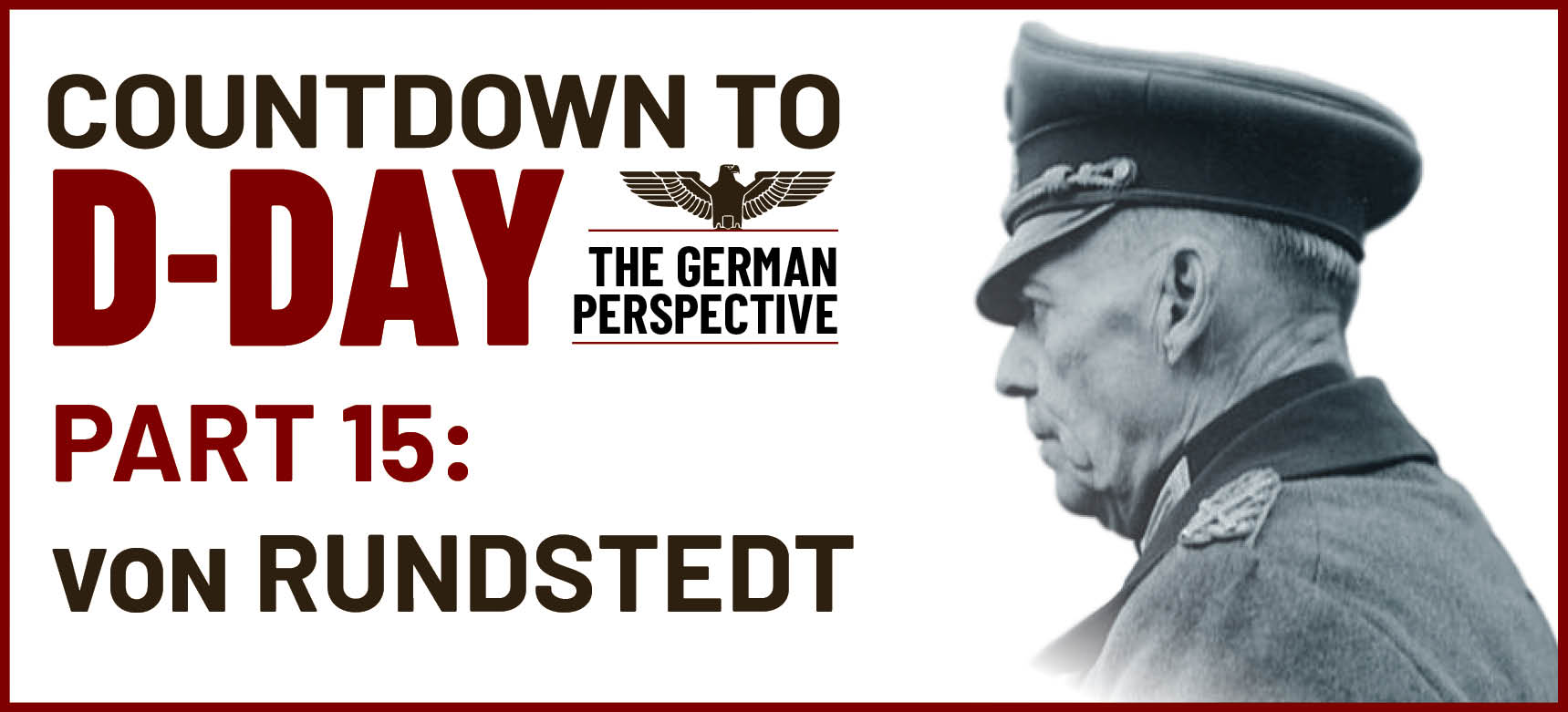In the final Countdown to D-Day officer bio, Peter Margaritis brings you the story of Gerd von Rundstedt, the Field Marshal and Commander-in-chief of the Western Front whose military genius was overridden by the whims of the Führer.
Generalfeldmarschall Karl Rudolf Gerd von Rundstedt by 1944 was one of the most well-known men in the Wehrmacht; certainly the most powerful in France. He was OB West―Commander, Western Theatre.
Now pushing seventy, this curt patrician was used to expensive tastes and the fine living, a lifestyle no doubt acquired during his earlier, aristocratic days; yet nearly everyone would concede that he was still a competent commander. He excelled when it came to open warfare and hated subterfuge of any type, which was why he seldom took seriously information acquired by spies.
In early June, OB West decided to again inspect the Normandy defences. Starting on June 6th, it would be a four-day tour of the beaches, accompanied by his son, Leutnant Hans Gerd. On the evening of June 5th, he was informed that the second verse of the Verlaine poem had been intercepted. But the field marshal put little credence in espionage-related matters. He despised subterfuge of any type. So he basically ignored it.
Messages began coming in after midnight about Fallshirmtruppen drops over an extensive area. Von Rundstedt, awoken around 1:30 a.m., carefully monitored their progress. An amphibious assault now seemed likely. Around 2:45 a.m., he ordered the 12th SS Panzer and Panzer Lehr divisions alerted. Both were to get ready to roll towards Caen.
Finally, at 4:25 a.m., von Rundstedt ordered Panzergruppe West to “reconnoitre in force into 711th Division sector.” OKW was informed by message what they were doing. A half hour, he sent a message to OKW requesting that the panzers all be released.
A couple of hours later though, Jodl called him and to his amazement, refused to release them. This might be a diversionary attack, so until the Führer awoke and decided to release them himself, the panzers were to remain where they were.
Disgusted, von Rundstedt left his command bunker and walked back up the hill to his villa to prune his roses.
Later that morning, Hitler agreed with Jodl’s decision and did not release the panzers until about 4 p.m. that day. By then it was too late; the Allies were ashore.
Over the next few weeks, von Rundstedt struggled to keep the Allies at bay, but finally, on July 2nd, Hitler, fed up with one setback after another, relieved him of command, replacing him with Field Marshal von Kluge. However, two months later, when von Kluge committed suicide and Rommel was recovering from a mortal wound, Hitler, faced with an enemy breakout in France, had no choice but to bring back von Rundstedt again.
In the late fall, von Rundstedt went on to plan and command the German offensive in the Ardennes in December 1944, but that ultimately failed. At last on March 9, 1945, after failing to defend the Rhine line, he was again relieved, this time for good.
He went to Bad Tölz with his wife and son and stayed there until he was captured by the Americans on May 1st.
Charged at Nuremberg with war crimes, von Rundstedt was never convicted. When his son Hans Gerd died of throat cancer on January 12, 1948, it emotionally shattered him. Finally, on May 6, 1949, the field marshal was released from captivity. Now sick and frail, his estate had been confiscated by the Allies, and he was broke. He and Bila were given temporary shelter in an old folks home in Celle. Bila died on October 4, 1952; and the field marshal succumbed to heart failure on February 24, 1953, in Hanover.
He was buried in the Stöckener Friedhof.
Gerd von Rundstedt and his role in the defence of the Atlantic Wall is explored in the new book, Countdown to D-Day, available now.


 Follow
Follow